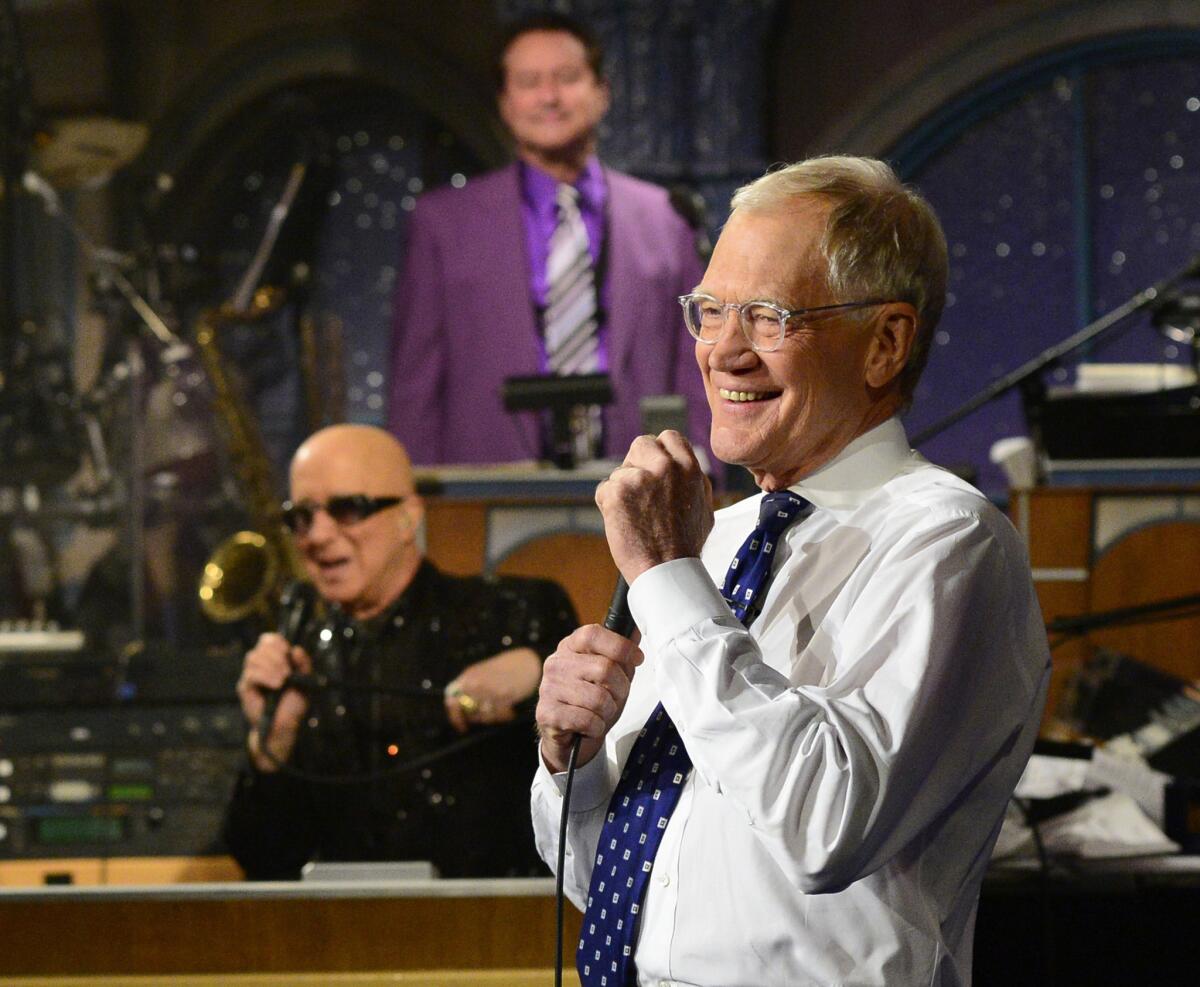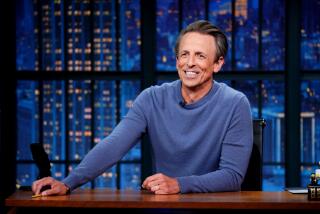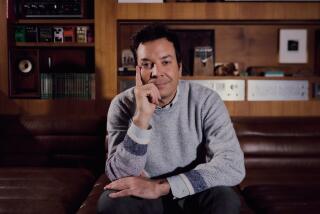Farewell to David Letterman, âa force of natureâ

David Letterman during the final taping of the âLate Show With David Letterman.â
A colleague came by my desk a couple of weeks ago to discuss the unexpected sorrow he felt while watching the final weeks of âLate Night With David Letterman.â
âI am surprised at how much it means to me,â he said.
I nodded sympathetically, but a lot was going on. Bruce Jenner had just come out as transgender, Baltimore was burning, âMad Menâ was ending, and the demands of Emmy season had begun. I knew, of course, that Dave was retiring and had been watching sporadically. To be honest, I had recorded more than I had watched, figuring I would crash through the final episodes and revisit some of the greatest hits in the days before the actual finale.
Full coverage: David Letterman retires
When I did, I realized exactly what my friend had been talking about. Like millions of Americans, I have watched David Letterman pretty much my entire life. Now he has left, and it feels like the bottom of my heart has come loose.
If there was any legitimate reason to choose sides in the vaunted late-night wars, I always chose Dave. It was a family tradition, like being a Democrat. I still remember my father laughing and calling us all to the kitchen one summer morning. âYou gotta see this guy,â he said, watching a morning show for the first and â when âThe David Letterman Showâ was canceled four months later â last time in his life. (Imagine morning television had NBC kept that show on. Imagine the world with a completely different timeline.)
I love Dave the way you love certain passages from your favorite book or the smell of turkey cooking on Thanksgiving Day, the way you love the bend in the road that means youâre almost home.
I will never feel that way again.
Dave is gone, he is gone and it is impossible to imagine a balance of opposing forces to match his sardonic compassion and his stalwart self-deprecation. What other host would begin a finale with five presidents announcing that âour long national nightmare is overâ? Johnny Carson allowed himself to be embraced and sung off his penultimate show with a near-tearful torch song by Bette Midler; Dave was thrilled by a virtually incomprehensible Bob Dylan, who appeared incapable of making eye contact, much less going in for a hug.
But Dave was never big on hugs, and that didnât change, even in the finale. He was, however, big on making a tough job look easy, and that didnât change either. He moved smoothly through his final show, cracking wise and taking care of business, as if it were any other.
Except for the business he took care of â revisiting old bits, issuing words of welcome to successor Stephen Colbert, offering a behind-the-scenes look at the show and counting down as a chorus line of top performers filled in the final signature list, âTop Ten Things Iâve Always Wanted to Say to Dave,â with jokes just the way Dave liked them: dry and unsentimental.
Forget heartfelt final words, brimming eyes or 11th-hour sentimentality, Dave stayed true to himself and the show, continually sharing the credit and pronoun usage with bandleader and comedic companion Paul Shaffer and sincerely thanking everyone who worked on the show, including his longtime boss and frequent punching bag, Les Moonves. He acknowledged the profusion of praise he has received in recent weeks as being âflattering, embarrassing and gratifyingâ but continually made sure everyone remembered that this was a comedic show. He didnât even allow himself the final word; he left that to the Foo Fighters.
As our news anchors lost their paternal mojo, we increasingly turned to late night for our sense and sensibility, for ritual and reassurance. Through boom and bust, war and peace, terrible tragedy and absurd pettiness, David Letterman was there, telling jokes, juggling fire extinguishers and ushering us safely to the inflatables.
Thirty-three years is a long time to act as a cultural North Star. Jimmy Fallon and Colbert are great in their own way, but does anyone really see them keeping the same seat for 30-odd years? Doing good work year after year, even if it means staying No. 2?
Dave is on, as he would say, a very short list. Only he and perhaps Carson understood the civic dedication necessary to do the job right. But while Carson was always Carson, Letterman was the smart, funny eccentric you might actually know. Not well enough to invite to your house for dinner but to hang out with for a limited time in a specific situation. Your old English professor or your highly literate and hilarious plumber, if either of them had their own TV shows.
This sentiment and others similar have been expressed in many ways in recent weeks. Famous people who actually know Dave came on to thank him for helping with their careers and to say things the rest of us were thinking.
How he helped America find its footing in the early days after the 9/11 attacks. How he kept to himself, but when a health crisis or personal scandal forced him to go public, he did so with candor, simplicity and just the right amount of self-deprecation. How he created a show that was the best of both worlds, pioneering all the wacky stunts the new hosts think theyâre inventing (for the record, nothing will ever be funnier than Dave working at McDonaldâs), but also keeping it real, couch-side.
âStupid people annoy you,â Julia Roberts said, explaining why Dave could be so hard on certain guests and why, precisely, many of us loved him so much. In any advanced society, stupidity should be an irritant; in far too many cases these days it is not.
He is a force of nature, David Letterman, though more glacier than tempest; slowly, he sculpted a lasting landscape. For all his quiet sarcasm and almost bitter self-doubt, David Letterman is, after all, a powerful man.
When NBC announced that Jay Leno would replace Carson on âThe Tonight Showâ all those years back, Carson had Letterman on the program. Though the two laughed often and fairly easily, there was fear in Carsonâs eyes when he asked the now famous question: âHow pissed off are you?â
Quite a bit, obviously, as he made clear. But Letterman kept that interview on the high road and even after he left NBC for CBS continued to openly idolize Carson, who made his final TV appearance on âLate Show.â
There are a million reasons to love David Letterman. The glee with which he dropped things off the top of the CBS building alone will do.
So it was easy to forgive George Clooney his private island on the Thames (Really? You couldnât just buy a house?) when he handcuffed himself to Dave and said âYouâre not going anywhere.â And who didnât feel wild hope when, on the penultimate show, Bill Murray suggested that perhaps retirement was not the best decision. If anyone could reverse this particular polarity, it was Mr. Bill Murray.
Alas, Lettermanâs mind was made up, and considering the months of wicked ribbing he gave Leno when he decided to return to âThe Tonight Show,â there was no chance of him changing it.
âYou leave,â he said, explaining â in what is now known as the âDonât Blame Conan Monologueâ â what Leno should have done when NBC moved him to 10 p.m. âYou donât.â
Then, switching to a maliciously good Leno impersonation, he added: ââYeah, OK, but Iâll be in the lobby if you need me.â You donât hang around.â
Dave, I think I speak for everyone when I say you are more than welcome to hang around. Lobby, alley, dinner, studio. Wherever and for as long as you want.
DAVID LETTERMANâS FAREWELL:
Why Letterman loves the Foo Fighters
Letterman delivers last Top 10 list in final show
Lettermanâs 33-year journey from cult hero to late-night institution
Bill Murray pops out of cake, leads singing mob for Letterman to stay
#ThanksDave: Chris Rock takes over Lettermanâs desk; Obama, Clintons pay tribute
More to Read
The complete guide to home viewing
Get Screen Gab for everything about the TV shows and streaming movies everyoneâs talking about.
You may occasionally receive promotional content from the Los Angeles Times.







